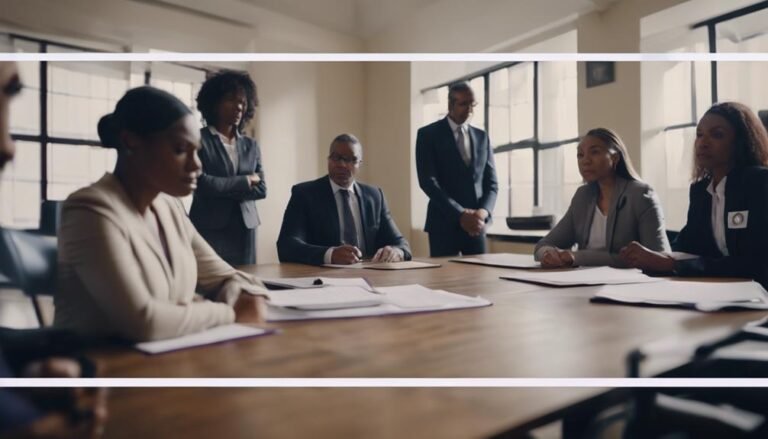Facing the relationship that almost took my life was a harrowing journey that brought me face to face with the deeply entrenched complexities of toxic relationships. Recognizing warning signs, setting boundaries, and seeking support are important steps in reclaiming power and breaking free. It’s normal to feel overwhelmed and scared, but tapping into inner strength and trusting instincts can lead to empowerment. Building resilience, engaging in self-care, and prioritizing well-being are essential in rebuilding after abuse. Therapy and support groups provide safe spaces to heal and develop healthy coping mechanisms. Trust in your worth and take steps towards a life free from harm.
Key Takeaways
- Recognize warning signs of toxicity.
- Break free from the cycle of abuse.
- Find strength to leave the relationship.
- Rebuild life after abuse.
- Address the impact on mental health.
Warning Signs of Toxic Relationships
Recognizing warning signs of toxic relationships is essential for one’s well-being and safety. It’s important to be aware of manipulative behaviors and toxic patterns that may harm us.
Setting boundaries and practicing self-care are key in safeguarding our mental and emotional health. When we notice red flags like constant criticism, manipulation, or controlling behavior, it’s important to trust our instincts and seek support.
Remember, you deserve to be treated with respect and kindness. By prioritizing your well-being and establishing healthy boundaries, you’re taking a powerful step towards creating a safe and nurturing environment for yourself.
Your safety and happiness matter, and it’s okay to seek help when needed.
Escaping the Cycle of Abuse
When starting on the path to breaking free from the cycle of abuse, it’s vital to understand the complexities that make leaving such a challenging journey.
The healing process isn’t linear; it involves ups and downs, setbacks, and breakthroughs. Taking the step to break silence is a pivotal move towards reclaiming your power and voice. It’s normal to feel overwhelmed, scared, and unsure about the future.
Remember, you aren’t alone on this journey to healing. Seeking support from trusted individuals or organizations specializing in abuse recovery can provide the guidance and resources needed to navigate this difficult path.
As you commence on this healing process, be gentle with yourself, celebrate small victories, and know that you deserve a life free from abuse.
Finding Strength to Break Free
Gathering the courage to break free from an abusive relationship can be a challenging and transformative journey. It requires tapping into your inner strength, recognizing your worth, and making empowering choices for your well-being.
Despite the fear and uncertainty, know that you aren’t alone. Taking that first step towards freedom is a powerful act of self-love and resilience. Trust in your ability to create a life free from abuse, filled with love and respect.
It may seem intimidating, but with each small decision to prioritize yourself, you’re reclaiming your power. Believe in your strength, trust your instincts, and know that you deserve a life free from harm.
Rebuilding Life After Abuse
Breaking free from an abusive relationship opens the door to a journey of rebuilding and rediscovering oneself. It’s important to focus on self-care strategies and building resilience during this challenging time.
Engaging in activities that bring joy, practicing mindfulness, and seeking support from loved ones or support groups can aid in the healing process. Setting boundaries and prioritizing your well-being are essential steps in rebuilding a life free from abuse.
Remember, it’s okay to seek professional help if needed and to take each day at your own pace. By embracing self-love, patience, and inner strength, you can gradually regain a sense of empowerment and create a future filled with hope and positivity.
Stay strong, and believe in your ability to overcome the past.
Impact on Mental Health

Coping with the aftermath of an abusive relationship can deeply impact one’s mental health, often leaving lasting emotional scars that require care and attention.
The healing process is unique for each individual, but therapy options can provide a safe space to explore and address the trauma. Seeking professional help, such as counseling or therapy, can assist in maneuvering through the complex emotions and rebuilding self-worth.
It’s crucial to remember that healing takes time and patience, and it’s important to seek support when needed. Engaging in therapy can aid in processing the past, developing healthy coping mechanisms, and moving forward towards a brighter future.
Resources for Support and Healing
Managing the aftermath of an abusive relationship can be overwhelming, but there are resources available to support your healing journey. Remember, you aren’t alone in this process. Building a strong support network is key to your healing.
Seek out organizations like Safe Horizon, the National Resource Center on Domestic Violence, and the National Coalition Against Domestic Violence for assistance. Connecting with other survivors can provide a sense of community and understanding.
Journaling your feelings and experiences can aid in recognizing patterns and processing emotions. Educating yourself about abuse dynamics empowers you to navigate the healing process. Take small steps each day towards healing, and remember, your well-being is a priority.
You deserve a life free from abuse and filled with peace.
Advocacy and Legal Protection

Understanding the intricacies of advocacy and legal protection in the aftermath of an abusive relationship can be a challenging yet essential step towards reclaiming your safety and autonomy.
When maneuvering this journey, remember that you have legal rights that protect you from further harm. Seeking protective orders can provide a layer of legal safety and help prevent your abuser from contacting or approaching you. It’s vital to educate yourself about these legal options and guarantee your well-being.
Advocacy organizations specializing in domestic violence can offer invaluable support and guidance as you navigate the legal system. Remember, you deserve to live free from fear and violence, and taking steps to assert your legal rights is a powerful way to reclaim your life.
Frequently Asked Questions
How Can I Help a Friend Who Is in an Abusive Relationship?
When helping a friend in an abusive relationship, Intervention strategies like creating a safety plan, Recognizing signs of abuse, Emotional support, and Providing resources such as hotlines and support groups are essential for their well-being.
What Are the Long-Term Effects of Emotional Abuse?
Emotional abuse can scar mental health, like invisible wounds that linger. It chips away at self-esteem, leaving cracks only time and healing can fill. Rebuilding is a journey of rediscovery and self-love.
Is It Possible to Rebuild Trust After Leaving an Abusive Partner?
Rebuilding trust after leaving an abusive partner is a crucial but challenging part of the healing process. It takes time, self-care, and support from others. Remember, you deserve love, respect, and a future free from abuse.
How Can I Support a Child Who Witnessed Domestic Violence?
When supporting a child who witnessed domestic violence, I believe in the power of symbolism. Encouraging child therapy, joining support groups, and creating a safe environment can help heal the scars of their past experiences.
What Legal Options Do I Have if I Want to Leave My Abuser?
If I want to leave my abuser, I can seek legal resources for restraining orders and safety planning. Counseling options are available for support and healing. It’s important to prioritize my safety and well-being during this challenging time.
Conclusion
In the darkness of abuse, I found the light of freedom. Though the journey was treacherous, the strength within me shone brighter than the shadows of fear.
Escaping the cycle of torment, I now stand tall, a survivor of the relationship that almost killed me.
Remember, in the depths of despair, there’s always a glimmer of hope waiting to guide you towards a brighter tomorrow. You aren’t alone.






